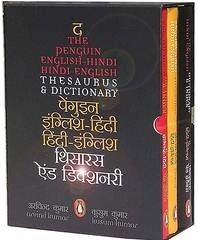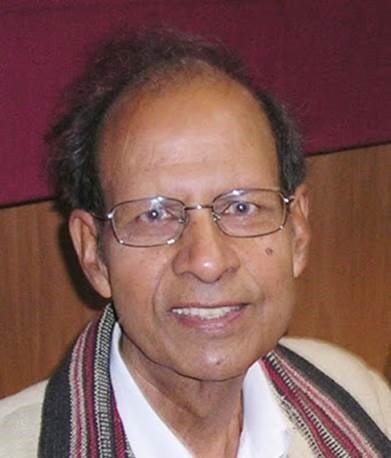16 April 1976. I could hardly wait for my last class VI exam to get over… I was so excited. Tomorrow, we – mummy, papa and bhaiya – would be leaving for Nasik for two whole months! What fun! Papa would be starting a book, a thesaurus, whatever, I didn’t understand much. We children would have a lovely time living in the Times of India’s bungalow there – cycling, playing badminton, eating, and sleeping in huge four poster beds! And so it was! I remember a couple of days after reaching Nasik, all four of us got up early and went for a dip in the river Godavari (yes, in those days, it was full of water, clean water, and one could actually bathe in it). We also bought a copper lotaa and got the date inscribed on it – 19 April 1976. Returning to the bungalow, papa wrote the first card of his Book (then titled Shabdeshwari) and all four of us signed on it, date and all. But I would appreciate the significance of that day only 20 years later, when in December 1996, the first copy of the book, by then renamed Samantar Kosh, was presented to the erstwhile President of India, Dr Shankar Dayal Sharma.
I have lived with my father’s work for forty of my fifty years of life. During my growing up years, when anyone would ask, “what does your father do”, I would say he is working on a book, a thesaurus. Except for a Math teacher in class IX, I don’t think anyone ever really understood. Not that it mattered. For the four of us, papa’s book was the most important thing in our lives.
The release of Samantar Kosh in 1996 was the realization of a dream; a dream papa saw in 1973 when he decided to make a thesaurus in Hindi himself. He had first come across Peter Mark Roget’s English thesaurus in the early 1950s. Thrilled with its usefulness, he had hoped that a similar work in Hindi would soon be prepared in independent India… twenty years later, in December 1973, when still there was none, he realized, in an epiphanic moment, that he himself was destined to make one! And he set forth… and our life changed.
In 1978, Papa gave up his job as the editor of Madhuri, the film magazine of the Times group, to work full-time on the Thesaurus. We had to move to Delhi because we did not have our own house in Bombay. In Delhi, my parents had constructed a house after their marriage in which my grandparents, uncle and his family lived. We moved in with them… my brother stayed back in Bombay for his MBBS… and I didn’t like any of it one bit. A new city, very very different from Bombay. New school, new classmates. New dynamics within the family. Life, as I had known it, had changed – forever.
In the twenty years from that fateful day in Nasik in April 1976 to the release of Samantar Kosh in 1996, me and my brother grew up and got busy with finding direction in our lives. Sumeet completed his MBBS and MS from Bombay and moved to Delhi. I completed my Masters in Nutrition from Lady Irwin College, joined an American NGO CARE and got married. In the meantime, Papa had to join the Reader’s Digest to launch the Hindi Sarvottam for five years to improve our financial situation. He survived a heart attack, bypass surgery and other health problems. Mummy continued working with papa in creating the database. Her most important contribution has been in taking extremely good care of his diet and health. Completing Samantar Kosh remained the family goal – always.
Sumeet’s moving to Delhi was nature’s way of ensuring that papa’s dream would soon come true. Sumeet realized the importance of computerizing papa’s database; he first worked in Iran for a year to organize funds for a computer, learned programming himself to create software for the database and then taught papa how to work on it… finally, he created programs to convert the database into a ready-to-print book which was handed over to National Book Trust on 13 September 1996 to be published as Samantar Kosh. He has been and continues to be an integral part of all papa’s works till date.
Samantar Kosh was an instant success, wholeheartedly welcomed all over. The Kosh introduced for first time the concept of a thesaurus to the Hindi, and thus revolutionized and added a new dimension to lexicography in India and the entire Hindi-using world. At the same time, it revived our ancient tradition of glorious albeit shorter Sanskrit thesauruses like Nighantu and Amar Kosh. An enthusiast called it “The Book of the Century; a Hindi weekly called it “A golden dot on Hindi’s forehead.” Writer and editor Mr. Khushwant Singh wrote: “It filled a lacuna and brought the Hindi language at par with the English.”
Post Samantar Kosh ~ Arvind Lexicon database and software
When Samantar Kosh was published, my daughter Tanvi was in primary school. One day, papa asked me how useful I thought Samantar Kosh was. I candidly told him that while it was extremely useful for a person who worked in Hindi alone, its utility for me – in my own writing and in teaching Tanvi – was limited since we tend to use both English and Hindi simultaneously and interchangeably. This conversation laid the foundation of linking the Samantar Kosh database with English. And this is when my active contribution to papa’s work began.
As a first step, I added English parallels for each heading and subheading in Samantar Kosh. Once this very basic exercise was completed, papa started work on the bilingual database. It would take another 10 years to make the English-Hindi database comprehensive and complete. In 2007, eleven years after the publication of Samantar Kosh, Penguin India and Yatra Books jointly published The Penguin English-Hindi/Hindi-English Thesaurus & Dictionary. This 3 volume, 3144 page magnum opus is the largest known bilingual thesaurus in the world! It offers a vast repertory of synonyms and antonyms along with cross-references to similar and opposite concepts, a feature not found in any thematic thesaurus.
Never the one to rest, papa continued to increase and improve his English-Hindi database, by now lovingly coined Arvind Lexicon by our family. The Arvind Lexicon database is comprehensive and comprises about one million expressions in all ~5,56,960 Hindi and 4,55,794 English (in total 10,12,754)! It is the only bilingual database of its kind in the world, and has the capacity to incorporate as many Indian and world languages as one likes, to create India’s bridges with all Indian and foreign languages.
Most importantly, Arvind Lexicon database is India-centric: our customs, ceremonies, rites and rituals as well as philosophies, doctrines, legends and folklore are all included to provide a complete understanding of the Indian culture. It also includes people, incidents and happenings important to India and Indians.
Moving on with the times, papa worked with Sumeet to create his pioneering online work in the area of Hindi and English lexicography: the vast Arvind Lexicon software. This epitome of modern Indian lexicography is without parallel. It combines the functionality of a thesaurus, dictionary and language explorer while offering its users synonyms and antonyms in Hindi, English and transliterated Roman script, side-by-side. Here, words may be searched and explored in either English or Hindi or transliterated Roman script. In India, where both English and Hindi are freely used, Arvind Lexicon supplies a direct link between the two languages. Arvind Lexicon was released in May 2011, the same month when papa was honored with the Shalaka Sammaan. Arvind Lexicon is available on an annual subscription basis from our website: www.arvindlexicon.com. A smaller version of Arvind Lexicon is also available free from this website.
This is when another family member, my husband Atul, joined our bandwagon… he had been actively using the Arvind Lexicon online software in translating The Bhagavad Gita from Hindi to English. He was amazed by the scope of Arvind Lexicon! It was at his suggestion, that I took up the role of promoting the Arvind Lexicon and all of papa’s work in a focused manner.
We formed our own company, Arvind Linguistics, which overlooks the publication and promotion of all of papa’s books and online software. More than a profit organization, we are a group of enthusiasts who seek to promote Indian languages in the modern context, and English within our Indian context. We seek to put Hindi and other Indian languages on the world scene … and are ready them to meet the challenges of globalization.
We seek to enhance channels of linguistic and visual communication with the entire world and to this end develop appropriate resources. We aim to create various types of dictionaries of our languages and English along with other world languages for a better understanding and proper usage of the rich vocabularies of these languages.
We want to campaign for more and more usage of Hindi and other Indian languages at government and private company levels. At the same time, we wish to enrich our languages with the best of world knowledge and bring them up-to-date with the most advanced world languages.
We purchased the entire stock of The Penguin English-Hindi/Hindi-English Thesaurus & Dictionary from Penguin India and are now the sole owners of the Work. In the last one year, we have published Arvind Word Power: English-Hindi, a ready reference alphabetical dictionary, thesaurus and mini-encyclopedia aimed at enhancing the user’s word power manifold. The book seamlessly juxtaposes English and Hindi vocabularies and helps the user find the correct Hindi equivalent for English words. (Alphabetically arranged, it provides various meanings for an English word, and further, for each meaning, it provides synonyms as well as links to similar and opposite concepts in both English and Hindi side by side. No existing English dictionary – Indian or foreign – includes Indian socio-cultural vocabulary and concepts to such a great extent. Arvind Word Power: Hindi-English is next up for publication. We have also published Arvind Tukant Kosh a unique book of 57,000 rhyming words as well as ShabdVedh, the story of papa’s 70 year long journey in the world of words. Many more dictionaries and thesauruses – monolingual and bilingual – are in the pipeline.
A new dream ~ World Bank of Words
Now at 87, papa has a new dream. His job is far from over…
He dreams of creating a World Bank of Words, a concept not yet proposed by anyone else anywhere. It is, he feels, something India needs in order to build linguistic bridges, on its own terms, with the world without resorting to any non-Indian English dictionary.
The Arvind Lexicon database is tailored for these linkages. As a first step, papa seeks to add Indian languages, one by one, to his vast data. He hopes to include foreign languages too. A new computer application that Sumeet has written is capable of thus expanding the work to create a giant “world bank of words”, even creating multi-language thesauruses. “There are great possibilities, he enthuses. “As long as languages keep on expanding and enriching themselves, my work cannot get over.”
All of us at Arvind Linguistics are committed to helping papa take his dreams forward.


Comments